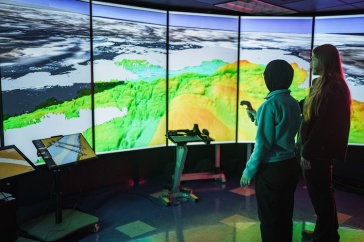 |
| Three sessions of UNH Tech Camp provided the opportunity to build and launch model rockets at Boulder Field on the UNH campus. More than 150 students participated in UNH Tech Camp’s multiple programs. (Photograph: Jeremy Gasowski) |
This summer, UNH was alive with the sights and sounds of model rockets firing, robots navigating obstacle courses and wind turbines being built.
But it wasn’t college students participating in such projects — it was elementary, middle and high school students enrolled in UNH Tech Camp, which provided hands-on STEM learning opportunities to youth throughout the state.
In the midst of New Hampshire’s “Year of STEM,” UNH hosted more than 400 students and 60 teachers in a variety of STEM camps and professional development seminars on the Durham and Manchester campuses.
The efforts were a component in filling the so-called STEM pipeline, engaging younger students in science, technology, engineering and math fields to prepare them for the higher education and employment opportunities expected to play a larger role in the future of New Hampshire’s economy. Recent research found students who went through a summer STEM program were eight times more likely to pursue a STEM career than their peers.
“These camps will have a tremendous impact on New Hampshire's workforce,” says PT “Vasu” Vasudevan, professor of chemical engineering and interim provost and vice president for academic affairs. “STEM literacy has to commence at a very young age, and I am delighted that UNH is a big contributor in this effort.”
 |
| Participants in Engineeristas spent time taking apart and putting back together multiple items in learning about the principles of engineering. UNH offered both day and residential camps to students entering grades four through college. (Photograph: Brooks Payette) |
Vasudevan was a member of Gov. Maggie Hassan’s STEM education task force charged with modernizing STEM education in New Hampshire. Hassan proclaimed 2015 as a “Year of STEM,” and the task force report, released in January, included a recommendation to implement project-based STEM topics in early grades. Such projects are a cornerstone of the UNH camps offered for students entering grades four through college.
“This is a great opportunity for our youth in the state to be trained by dedicated faculty, staff and college students during the summer months,” says Vasudevan.
Rising UNH sophomore Mike Locke was one of many UNH students who served as a Tech Camp counselor or project leader. He developed a VEX Robotic program, expanding fundamental robotics utilized in Elementary Program Introducing Computing (EPIC), another summer UNH offering.
Locke’s students designed, built and programmed VEX robots to accomplish tasks. The project included multiple redesigns and programming robots autonomously to operate without human interaction.

Karen Jin, lecturer in computer science, and Brianna Smith, a rising sophomore in computer science, lead students through a robotics activity during Tech Camp’s Elementary Program Introducing Computing (EPIC) in Kingsbury Hall. EPIC hosted two sessions in 2015 and plans to expand its offerings this fall. (Photograph: Meghan Hill)
“Tech Camp is the perfect environment for kids to explore STEM education,” says Locke. “They are viewing STEM as a fun and interesting subject, and that inspires them to continue STEM education into the future.”
Tech Camp counselor Kim Warburton, a science teacher at Hampton Academy, says students and teachers benefit greatly from the facilities, resources and equipment available on a college campus.
“This allows the campers an opportunity to see what college holds for them. It makes a huge impact.” “Most public elementary and secondary schools would love to have these resources in their schools, but budgets just don't make it possible,” she says. “This allows the campers an opportunity to see what college holds for them. It makes a huge impact.”
Though the full impact is still to be determined, the popularity of the programs has grown tremendously. UNH Tech Camp, which includes Engineeristas, Techsplorers, Techventures and EPIC, began in 2007 with 19 students; the camps recently hosted 156 campers during a three-week period.
“There is a significant interest from families in New Hampshire,” says Robert Henry, professor of civil engineering and a nine-year veteran of Tech Camp. “One would have to assume that this interest will translate into more students entering the engineering career pipeline.”
In September, UNH’s College of Engineering and Physical Sciences will bring STEM opportunities to New Hampshire’s North Country, reaching 30-plus teachers and more than 400 students from 15 schools. The initiative will bring 16 students and seven faculty members to Berlin on September 26 for STEMfest, which will include project-based activities for students and a professional development seminar for teachers.
Tech for Teachers
Tech Camp expanded in 2015 to include Tech for Teachers. The weeklong program was developed to help teachers create design-based approaches for curricula that meet Next Generation Science Standards, which were developed with representatives from 26 states. The effort also aligns with recommendations in the STEM Task Report and helps fulfill UNH’s commitment to the national 100Kin10 initiative to train and retain 100,000 STEM teachers by the year 2021.
Diane Silva Pimentel, assistant professor of education at UNH, served as a co-coordinator for Tech for Teachers. She says the feedback was positive and believes the educators took away experiences that will benefit more students through classroom activities.
“These teachers have a new perspective when they approach lessons and think about how to engage students in science instruction,” she says. “We have created a support group that will allow teachers to bounce ideas off each other and talk about curriculum development.”
-
Written By:
Brooks Payette | College of Engineering and Physical Sciences

















































